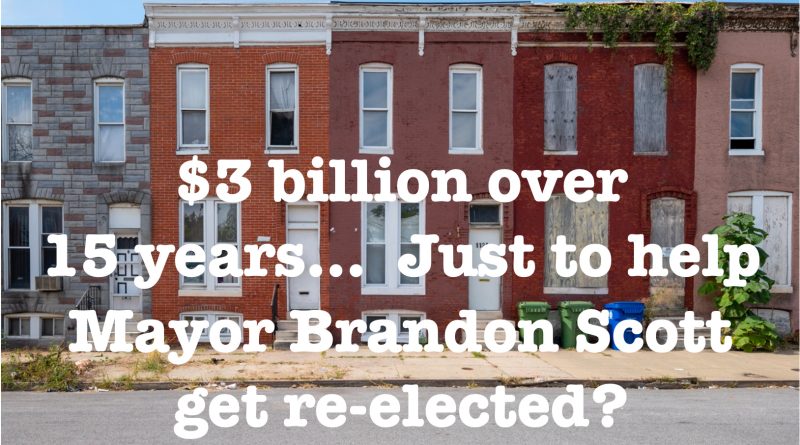Missing the Point – ‘The Developers’ Mayor’ Strikes Again
Hi. Do you ever have one of those days, weeks, months, or years when you have so much to do you don’t know what to do first? Well, I’m having one of those moments right now having just read about Mayor Brandon Scott’s $3 billion, 15-year proposal for dealing with Baltimore’s vast inventory of vacant properties. “Yikes!”
There’s so much wrong with this program, I don’t know where to start. I’ll just let my hover over the keyboard of my laptop and we’ll see what happens.
So, what exactly is motivating Mayor Scott? He’s been Mayor for three years and, briefly, President of the City Council before that. Did dealing with Baltimore’s longstanding vacant properties problem just occur to him? …Of course not. What’s happened is that he’s running for re-election and needs to do something to impress voters who, understandably, may be wondering what he does all day.
Financially speaking, his proposal is light years away from being a sure thing… In fact, he’s so desperate, he’s announced his proposal well, well in advance of having the money to fund it. Forget, for the moment, about whether or not it’s worth doing. The city will be putting up only ten percent ($300 million) of the total estimated cost of $3 billion – and that’s not even a done deal. As for the other ninety percent that’s coming from a combination of state, federal and unspecified private sources? Good luck with that. The fact is, it’s not a “plan” in any real sense of the term. It’s a political ruse that’s meant to distract voters and some contributors from the unproductive reality of Mayor Scott’s administration.
And of course, it’s short on details because it’s impossible at this stage to be specific about a 15-year unfunded program. At best, his proposal is just a concept he’s floating out there for the press he’s going to get, to make it seem like he’s taking the initiative while continuing to do nothing in particular.
Over 15 years? How convenient is that? Politics and term limits being what they are, Mayor Scott will be long gone from City Hall before his proposal fails – and that assumes he can get funding for it which is unlikely. He’ll get credit for meaning well. Beyond that, the city will be stuck with his program and its failure to accomplish its objectives will be some other Mayor’s problem.
What’s a “TIF” that the Mayor is suggesting as a source of some of the funding? TIF stands for “Tax Increment Financing.” Basically, he’s proposing that half the city’s $300 million contribution will come from borrowing against future tax revenues that the city may need for other, more urgent purposes. Put another way, the Mayor is proposing to pay for investments the city makes today out of the tax proceeds those investments may or may not eventually yield.
Has the Mayor ever been to Baltimore? According to BaltimoreCity.gov, “Baltimore ranks 87 out of the 100 largest U.S. cities in terms of median household income.” Approximately 23% of the city’s population lives at or below the Federal Poverty Level. 40% lives at or below 150% of that marker. FYI, for a family of four, the overall U.S. FPL is an annual gross income of only $27,750. That’s barely more than a single full-time job paying the minimum wage in Maryland. These people don’t need help that may or may not materialize over the next 15 years. They needed help yesterday.
Even if the Mayor’s proposal were to be accomplished instantly, who would it help? Developers, of course, who would be the recipients of the $3 billion plus any beneficial effects on downtown and other investments they have already made in the city. And maybe financially successful immigrants moving to Baltimore? Who are willing to overlook Baltimore’s many other problems with crime and worst-in-the-state public education? To take new jobs and consume new housing for which many of the city’s current residents can’t qualify and which they can’t afford?
ATTN: People of Baltimore in the lower half of the economy. If the Mayor’s proposal succeeds, you’re going have to find someplace else to live. And work, unless having multiple low-end jobs forever is okay with you and your family. Why are you going to have to move? Because all this new development is going to create a city, smack dab in your current neighborhood, where you can no longer afford to live.
Mayor Scott should spend less time worrying about keeping his own job and more time finding better-paying jobs for the city’s un- and under-employed. I don’t think he gets how the economy works. Let me see if I can help…
In a reasonably free-market capitalist economy, the most cost-effective way to help people rise out of poverty – and leave all its economic, social, and cultural disadvantages behind them – is by getting them reliable, long-term jobs that pay a living wage or better. Quality public education, in a safe and encouraging community environment conducive to learning, is one way out. In the meantime, the city, state, and federal government can support on-the-job training that puts tens of thousands of Baltimore families to work at better-paying jobs with the potential for upward mobility.
What? It takes time to bring the companies to the city that would hire all these people? Sure, but until that happens, you could help them get jobs in the suburbs which are now going begging. The “suburbs,” if you’re reading this Mayor Scott, are where the county economies are so strong as to have given Maryland the lowest unemployment rate in the country at just 1.7%.
What, again? You say the city’s un- and under-employed can’t get those suburban jobs because, according to the U.S. Census Bureau, 27% of the city’s households don’t have cars. Well, here’s an idea. Give any city family who can find a good job in the suburbs a guarantee for their new car payments, insurance, and a gas card. Lower-income families don’t have the credit to buy a new car. The auto manufacturers will be glad to help. And the city will cover its risk and investment by having the costs of the program deducted from worker paychecks. …The city can do all this if you’d only get off the phone with your campaign contributors for long enough to do the job for which you were elected.
With money in their pockets, families will invest in better housing and other essential stuff. Like groceries. And, not incidentally, criminal activity for some of them will be a less advisable alternative to legitimate work.
What about all that vacant property you’re pretending to be, all of a sudden, so worried about? Just give it away, very thoughtfully, to companies who have the right mix of labor-intensive workforce requirements, who are willing to hire and train the city’s residents who are most in need of employment and better jobs. Use the vacant properties as incentives to companies whose collective activities will create a fully integrated, all-inclusive, self-sustaining urban economy. Give the private sector the right incentives and the city can keep its money in the bank.
So, uh, how will you know what companies and local projects to look for and support? By talking less to your campaign contributors and more to experts, independent planners, economists, and other specialists. They’ll help you come up with a real plan, Mr. Mayor, that doesn’t take 15 years and $3 billion to save the city you’ve pretended all these years to care about.

Les Cohen is a long-term Marylander, having grown up in Annapolis. Professionally, he writes and edits materials for business and political clients from his base of operations in Columbia, Maryland. He has a Ph.D. in Urban and Regional Economics. Leave a comment or feel free to send him an email to [email protected].

